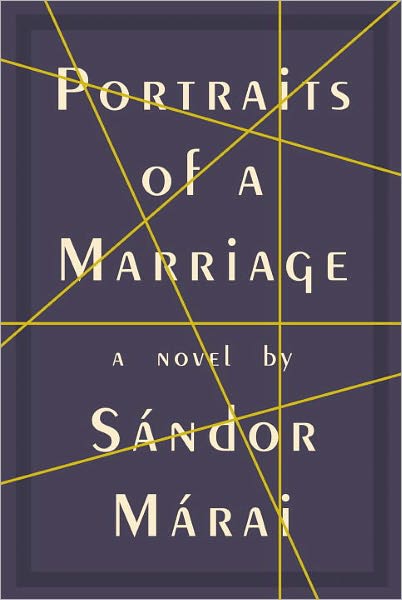Bethany:
After we read and discussed Embers, my husband noticed another book by Sándor Márai at the library. It didn't look terribly interesting to me, but I cracked it open to scan the first page.
Wow. Have you ever read a story written like that? It's almost impossible for me to not notice what kind of voice a writer is using, what with so many first person and present tense novels out right now, and Sándor Márai certainly ventures off the beaten track in this book. The reader is basically eavesdropping on three different conversations (four, if you count the epilogue) that all in various ways give personal portraits of a marriage.
Most briefly, the marriage spoken of in the title is that of Ilonka, a beautiful and passionate middle-class woman, and Peter, a serious and distant man who twice proposed to his mother's servant, Judit, an independent and strongminded survivor.
Through the contrasting perspectives of the three main characters, Sándor Márai explores different views on what leads to breakdowns in class communication, marriage, family, and ultimately culture.
It's not quite as soap opera-y as it sounds, though. Although the first section does seem to set up a melodramatic love triangle (as does the somewhat misleading title of the book; really the thing that ties all the stories together is less "a marriage" and more each of the characters' respective friendships with a writer, Lázár), the story itself is more linear than repetitive. While the following perspectives do go back and reflect a little on what happened during the timeline of the previous perspectives, for the most part they move forward. The first speaks of the marriage disintegrating and why, the second speaks of how things got all messy from there, the third speaks of the affect of the war, and the fourth wraps everything up.
I've come to the conclusion that Sándor Márai was brilliant at very subtly and accurately displaying quirks and qualms of different personalities. Each of the voices telling his or her story feels strong, unique, real. And misled. Just like our own internal monologues, we see what each character feels they way he or she does, but as an outsider we can also see the flaws and the shortcomings. None of the viewpoint characters are noble or even likable all the time, but they all have moments where they pull on the readers' sympathy. And each of them can see the exact same event and confidently come to a completely different conclusion.
Most interesting at all is the glimpse of something mysterious and ephemeral, a slice of history in a place generally not much represented in fiction: life for Hungarians before, during, and after World War II.
Gently, as if talking to a madman, I asked why he thought that olives, of the kind I had actually eaten some time in the past in a small Italian restaurant in that part of London known as Soho, were destined to play such an important part in my current and possibly future life. . . .
"Because that culture is over," he said in a friendly, patient manner. . . . Taste is an aspect of culture," he said, and raised his hand, like a conductor in a concert waving in some crescendo of destruction, "And it's all vanishing. It will vanish even if elements of it remain. They may still be selling olives stuffed with pimientos somewhere in the future, but the class that cultivated the taste for it and understood what it meant will have vanished. There will remain only the knowing about it, which is not the same thing. Culture is experience, I say," he intoned like a priest, his hand raised. "It is living experience, timeless as sunshine. To know about things is to know merely secondhand. It is like wearing secondhand clothes." He shrugged, then added courteously, "Which is why I am glad that you did at least have the opportunity of tasting olives." And as he finished the sentence, a shell burst nearby, like a precisely placed period, shaking the building.
If historical and personal navel-gazing is like pulling teeth to you, well, I don't need to tell you to avoid this like shrapnel. If this sort of history and character study fascinates you, though, I would highly recommend Portraits of a Marriage. It is beautifully written and translated and will haunt you in a good way.





Post a Comment